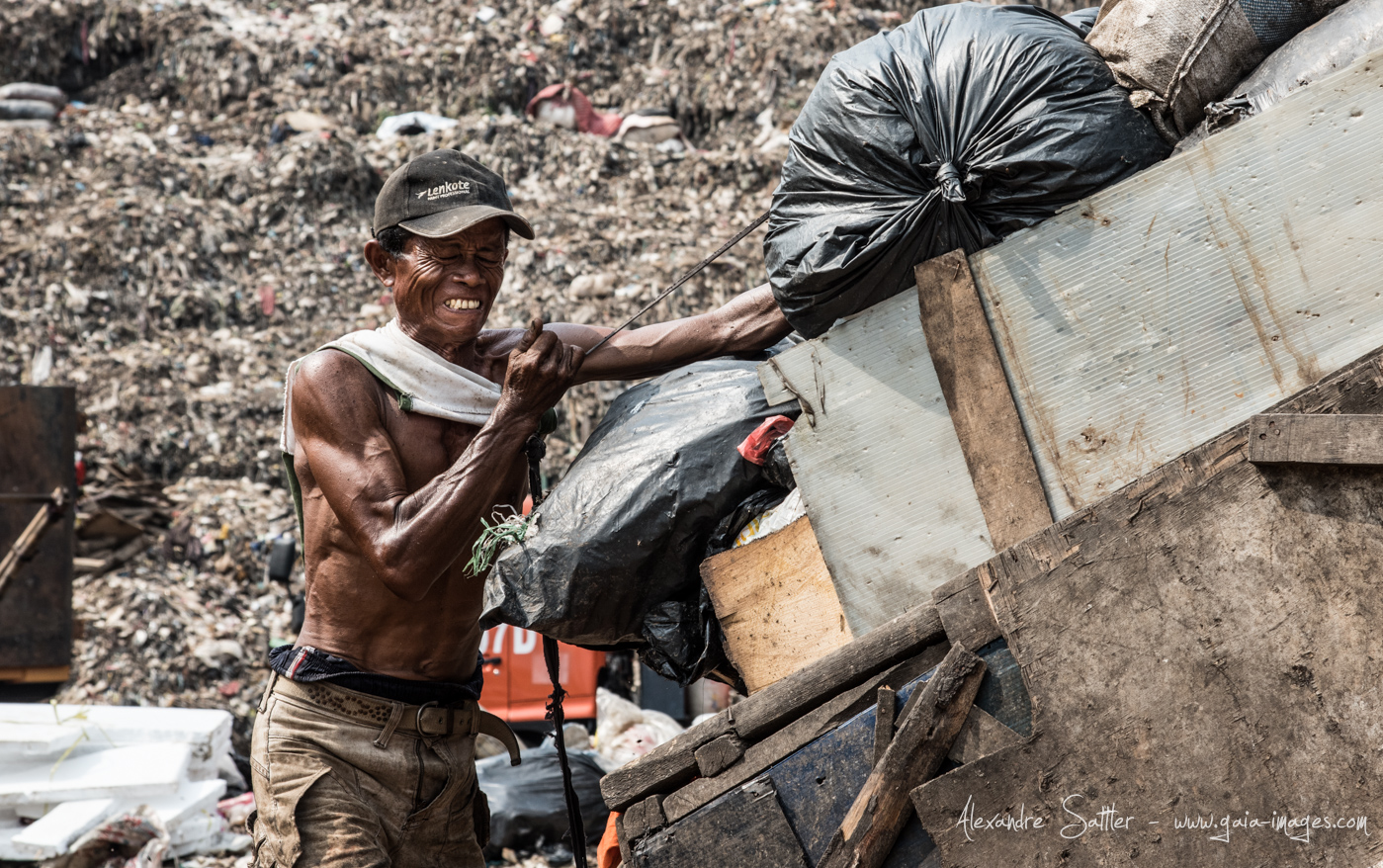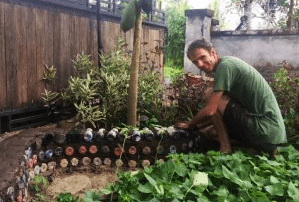I’ve got good news about plastic waste! Around the world there is now less and less trash.
In fact, just by reading this little essay of mine, there will be a little less trash in the world. Hurray! Because, as we all know, the whales and dolphins are literally drowning in an ocean of thrown-away-plastic pollution. No matter how far we throw our piece of trash, like a condemned soul, it comes back to haunt us. This is because the problem with trash is the very idea of trash— a concept that evolved out of Western religion and the Industrial Revolution. Thus, truly solving pollution has nothing to do with Industry. Recycling plants, incinerators and even a giant vacuum in the ocean are powerless to get to the heart of the problem. Rather, the solution to plastic, trash, and pollution has to do with you and me. And, it’s got everything to do with… well, Love.
Let me explain.
I had the opportunity to live in the mountains of the Northern Philippines, in the land of the Igorot people, for four years. One of the few unconquered indigenous peoples on the planet, their language and culture remains strong. I was fascinated to discover that in the Igorot language, there was no equivalent word for “Trash”(1). The idea of something “worthless” simply did not exist in their world view. Everything from food containers, backpacks, tools and houses were made from local, organic resources. Everything, once its time was up, would eventually biodegrade and fit seamlessly back into the cycles of life.
Interestingly enough, this was also the case in Europe several centuries ago. The word “trash” comes from the 14th century, from the old Norse word Tros, which meant Fallen leaves or twigs.
However, during the Industrial Revolution, the definition began to evolve. New materials and substances began to be created: Coal and petroleum by-products, then plastics emerged. These substances, when their usefulness was consumed, didn’t fit back into the circles of life when eventually they needed to be thrown away. “Trash” came to be a verb meaning to discard as worthless. This wasn’t just a new verb– It marked a new way of seeing– and judging– the world.
Unlike the culture of the Igorots, Western Judeo-Christian culture, with its deeply entrenched concepts of Heaven and Hell, had a clear scheme of judging Good and Bad. Perhaps this is why the Industrial concept of Trash flourished and came to pervade the Western world view. After all, the act of “trashing” an object is essentially a condemnation. We are judging the object to be worthless and no longer fit for a place in our world. Indeed, the places where we send trash to are remarkably similar to Hell. If you’ve ever walked through your city’s desolate, burning, noxious dumpsite, you will know exactly what I mean.
Of course, unlike the biblical Heaven or Hell, no matter how far away we throw the plastic, it doesn’t go away. Environmentalists are quick to point out that plastic “will last for one thousand years”. Indeed, the plastic might burn, photo-degrade, or disintegrates into the earth, air and water– but its molecules don’t go away (2). Not only do they not fit into the circles of life, but they interfere with healthy ecosystems. Like festering wounds on the surface of the Earth, dumps contaminate rivers and fields for generations to come.
Interestingly enough, Jesus warns ardently of the perils of judgement (3). And rightly so. Whether we are judging ourselves, others, or a material like plastic, a toxic amplification cycle begins. If we’re serious about transcending pollution, it is important to realize the perilous condemnation that we make using the word ‘Trash’.
Fact is, there’s nothing inherently bad about plastic. It’s made from neutral atoms and molecules just like everything else. Indeed, plastic molecules have ancient organic heritage! Plastics are made from petroleum by-products. Petrochemicals come from oil. Oil– that black goo we extract from the earth, is made over millions of years from ancient rainforests compressed under the ground. And, rainforests are as organic as you can get.
Fact is, plastic is a tremendously unique and useful substance. A century of scientists have worked passionately to concoct plastics myriad of properties, with the intention of making the world a better place. Indeed, one of the very first reasons to make plastics was to save the elephants in the Congo. With the rapid rise in popularity of billiards in America in the 1850’s, elephants were being slaughtered to extinction for their ivory– the only material known to make the perfect billiard ball. Amateur scientist strove for a decade to finally concoct an equivalent ivory-ball material. Soon other uses and previously unfathomable innovations like film, photography and celluloid movies followed. The smart phone you are reading this on– and indeed the very ideas in this essay, would not have been possible without the human evolution in consciousness represented by the development of plastic. In many ways, our technological evolution is a reflection of our biological evolution– plastic, trash and pollution, being a phase on our collective journey as a species.
And so, here we are today. Rather than continued condemnation, it’s time to embrace plastic it for what it is. It’s time to give it some much needed… Love.
What does it mean to love plastic?
First, we take a closer look at the material. We try to understand it better. With a little light, the illusions surrounding plastic are dispelled. It fast becomes clear that throwing away, burning, and even recycling plastic (4) are not real solutions. It also becomes clear that used the right way; plastic has many benefits and local applications. With this, a magical transformation happens. That piece of plastic you were about to throw away… it’s no longer “trash”! It is now something to segregate, save and treat with the respect that it deserves.
Around the world folks are starting to love plastic, and magically, the trash is disappearing. Movements are blossoming that literally love-away waste. The http://Precious-Plastic.org site shares open source blue prints for machines that you can build in your garage to extrude plastic into a useful raw material. In Guatemala, Pura Vida Atlan (5) has developed a building method for making schools with plastic bottles filled with plastic “waste”. Also known as Ecobricks (6), these bottle bricks are being used in Indonesia to make modular tables and chairs. In the Philippines, schools use ecobricks to make “Food Forest Play Parks”. In Africa, a simple wood press is used to make UbuntuBlox (7) out of miscellaneous plastic and styrofoam. Styrofoam, once a cursed material, is seen differently by an UbuntuBlox builder “Styrofoam has beneficial qualities for use in construction: It is lightweight, so it is easy to work with”. It’s all about the shift in perception.
Loving plastic has an unexpected side effect– plastic itself starts to disappear from our lives and world. Back in my home, my partner and I are ultra-careful about consuming plastic. Knowing well the potential perils of plastic, we avoid it as much as possible. For us it is clearly insane to use a long lasting material like plastic for one-time use products, packaging or containers. Instead we make our own items, commission or buy them from organic materials. Everything from our cutlery, to our toiletries, to the keyboard that I write this essay on are made from wood or bamboo. Living among the Igorots, I gained a deep respect for their 100% organic, zero-plastic, cradle-to-cradle, locally-sourced creations, that are the product of dozens of generations of prototyping and refinement. I’ve long since done away with my synthetic back-back and now proudly use my ultra durable (yet biodegradable!), Igorot rattan back-pack everywhere I go.
But to truly love plastic, there’s one more step. For many, it is the hardest.
Loving plastic, means accepting more than just the material, it also means accepting our place in the centuries of human evolution and industry that has been so destructively exploiting the planet.
As I go through my segregation box I am conscious that each piece of plastic that I have consumed symbolizes my part in this old paradigm of judgement, condemnation, and exploitation of people and matter. Just as throwing away trash is a phase of my life as a human to move on from, trash is a phase of our evolution as humanity to move on from.
Now, go take a look inside your trash bin.
All you see is plastic right?
Hurray!
Russell Maier is a regenerative designer based in Bali, Indonesia. Russell is one of the co-founders of the Global Ecobrick Alliances. He works throughout Indonesia developing organic designs, spreading trash transformation, and innovating with ecobricks. Oh, and the occasional philosophical essay. See https://russs.net for more.
Lead photo by Alexander Sattler, Gaia Images — A recycler tying down a load of plastic in Suwung dumpsite, Bali, Indonesia, 2016.
Contact Russell to publish this story in other locations: www.russs.net/contact
Footnotes:
1. In Kan’kanue, the Igorot language, the Spanish/Tagalog word basura is now used to describe used and worthless plastic. This recent linguistic adoption, in particular in Tagalog (the national Filipino language), is a direct influence of the Spanish and Catholic colonization of the southern Philippines.
2. Polymers Journal, 2013, ISSN 2073-4360 Plastic Degradation and its Environmental Implications
3. Matthew 7:2. “For with the judgment you pronounce you will be judged, and with the measure you use it will be measured to you.
4. See my essay Recycling, The Evil Illusion: https://www.patreon.com/posts/recycling-evil-5850561
5. See http://puravidaatitlan.org/
6. See www.ecobricks.org or Wikipedia entry on Ecobricks
7. See http://ubuntublox.com/


